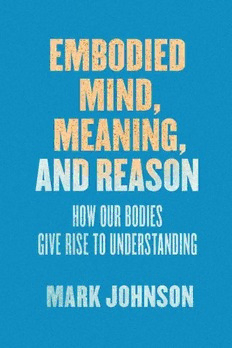
Embodied Mind, Meaning, and Reason: How Our Bodies Give Rise to Understanding PDF
Preview Embodied Mind, Meaning, and Reason: How Our Bodies Give Rise to Understanding
Embodied Mind, Meaning, and Reason M a r k J o h n s o n Embodied Mind, Meaning, and Reason how our Bodies Give rise to understandinG The University of Chicago Press Chicago & London The University of Chicago Press, Chicago 60637 The University of Chicago Press, Ltd., London © 2017 by The University of Chicago All rights reserved. No part of this book may be used or reproduced in any manner whatsoever without written permission, except in the case of brief quotations in critical articles and reviews. For more information, contact the University of Chicago Press, 1427 E. 60th St., Chicago, IL 60637. Published 2017 Printed in the United States of America 26 25 24 23 22 21 20 19 18 17 1 2 3 4 5 isBn- 13: 978- 0- 226- 50011- 9 (cloth) isBn- 13: 978- 0- 226- 50025- 6 (paper) isBn- 13: 978- 0- 226- 50039- 3 (e- book) doi: 10.7208/chicago/9780226500393.001.0001 Library of Congress Cataloging-in-Publication Data Names: Johnson, Mark, 1949– author. Title: Embodied mind, meaning, and reason : how our bodies give rise to understanding / Mark Johnson. Description: Chicago : The University of Chicago Press, 2017. | Includes bibliographical references and index. Identifiers: LCCn 2017018048| isBn 9780226500119 (cloth : alk. paper) | isBn 9780226500256 (pbk. : alk. paper) | isBn 9780226500393 (e-book) Subjects: LCsh: Mind and body. | Philosophy of mind. | Human body (Philosophy) | Meaning (Philosophy) | Consciousness. | Cognition. Classification: LCC BF161 .J64 2017 | ddC 128—dc23 LC record available at https://lccn.loc.gov/2017018048 ♾ This paper meets the requirements of ansi/niso Z39.48–1992 (Permanence of Paper). For My GranddauGhter, Sophia Marie Reyes Johnson, who is the most exuberant and joyful embodiment of life I have ever known Contents Introduction: Bringing the Body to Mind 1 1 Cognitive Science and Dewey’s Theory of Mind, Thought, and Language 37 2 Cowboy Bill Rides Herd on the Range of Consciousness 57 3 We Are Live Creatures: Embodiment, American Pragmatism, and the Cognitive Organism 67 Mark Johnson and tiM rohrer 4 The Meaning of the Body 98 5 The Philosophical Significance of Image Schemas 123 6 Action, Embodied Meaning, and Thought 142 7 Knowing through the Body 166 8 Embodied Realism and Truth Incarnate 190 9 Why the Body Matters 220 Acknowledgments 229 Notes 231 References 235 Index 247 introduCtion Bringing the Body to Mind This book develops an argument for the central importance of our bodies in everything we experience, mean, think, say, value, and do. It proposes an embodied conception of mind and then shows how mean- ing and thought are profoundly shaped and constituted by the nature of our bodily perception, action, and feeling. In short, it argues that we will not understand any of the issues that are so dear to philosophy until we have a deep and detailed understanding of how our embodiment gives rise to experience, meaning, and thought. The view of mind, meaning, thought, and language that I elaborate here was anticipated, in part, in the writings of the American pragmatist philosopher John Dewey, and to a lesser extent in the works of William James and C. S. Peirce. However, I am not just serving up a heaping portion of warmed- over Dewey. Since Dewey’s day we have had the privilege of important scientific and philosophical developments that supply crucial details about the processes of meaning and understanding that take us beyond what Dewey could provide. This research from the sciences of mind helps give flesh and blood to some of Dewey’s more skeletal remarks about how organism- environment interactions gener- ate meaningful experience. I do, nonetheless, remain a fan of Dewey’s insistence on the key role of experience as the starting and ending point of any useful philosophical inquiry. Consequently, I take issue along the way with the orientation known as “linguistic” or “analytic” pragma- tism, which grew mostly under the inspiration and influence of Richard Rorty, who saw philosophy as focused on language and what he called
